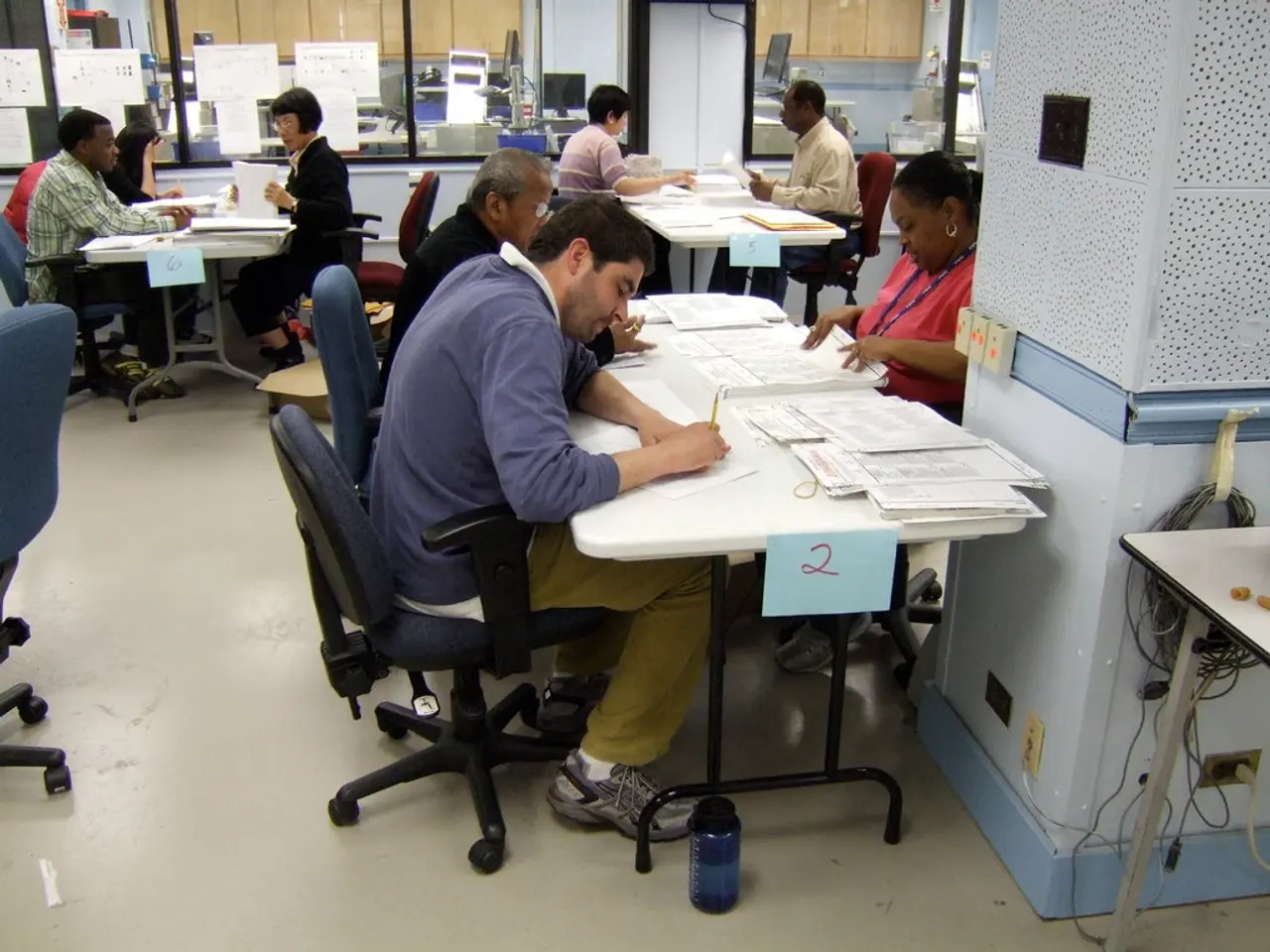Boosting Efficiency: Strategies to Flourish with Adult Attention Deficit Hyperactivity Disorder
## Empowering Adults with ADHD: A Comprehensive Guide to Building a Productivity Toolkit
Living with Attention Deficit Hyperactivity Disorder (ADHD) can present unique challenges in managing daily tasks, maintaining focus, and organising one's life. However, with the right strategies and tools, it is possible to create a productivity toolkit that caters to the specific needs of adults with ADHD, enabling them to thrive in their personal and professional lives.
## Essential Strategies
A key component of an effective productivity toolkit is breaking down tasks into manageable steps. Large tasks can feel overwhelming, leading to procrastination. By breaking them into smaller, actionable steps, they become less intimidating and more achievable.
Time blocking is another crucial strategy. Allocating specific time slots for tasks helps create a predictable routine and reduces decision fatigue. Incorporating buffer zones between tasks allows for transitions and prevents burnout.
Building flexible routines is essential. While structure provides necessary scaffolding, rigidity can lead to frustration. Establishing consistent daily routines that allow for flexibility is key to maintaining productivity.
Minimising distractions is also vital in a productivity toolkit. Creating a focused work environment by reducing clutter, using noise-canceling headphones, or leveraging apps that block distracting websites can help individuals with ADHD stay focused and productive.
Embracing accountability is another important aspect. Partnering with a friend, coach, or using digital tools that provide reminders and check-ins can help maintain motivation and ensure tasks are completed.
Prioritising self-care is crucial in managing adult ADHD. Ensuring adequate sleep, regular exercise, and a balanced diet significantly impacts cognitive function and emotional regulation.
## Tools & Apps
A productive toolkit for adults with ADHD would not be complete without the right tools and apps.
Task management apps such as Asana, Trello, and Notion offer visual boards, to-do lists, and deadline tracking, making it easier to organise tasks and manage deadlines.
Focus and distraction apps like Freedom, Serene, and Forest can help minimise distractions by blocking distracting websites, offering timed focus sessions, and gamifying the focus experience.
Reminders and routines apps like Due, Google Assistant, and Alexa provide persistent reminders, voice commands, and smart routines, helping individuals with ADHD stay on track and manage their time effectively.
Time tracking apps like RescueTime track time spent on various activities, offering feedback on focus and productivity, while apps like Focus@Will provide music designed to enhance focus and concentration.
## Practical Techniques
In addition to tools and apps, practical techniques play a significant role in managing adult ADHD.
A daily brain dump involves writing down all tasks and thoughts to clear mental clutter. Reviewing, eliminating non-essentials, prioritising, and organising the remaining items into actionable steps helps manage tasks more effectively.
The two-minute rule suggests that if a task takes less than two minutes, it should be done immediately. This helps reduce backlog and build momentum.
Voice assistants like Siri, Alexa, or Google Assistant can be used to set reminders, create lists, and manage routines without taxing working memory.
ADHD-focused therapy can provide valuable guidance on adapting one's daily life to accommodate unique needs and strengths, while teaching tailored time management and organisational skills suited for nonlinear thinkers.
## Sample Toolkit Workflow
A sample toolkit workflow might involve using a voice assistant to run a morning checklist (meds, water, planner review), performing a brain dump, prioritising tasks using a digital tool like Asana or Trello, working in time-blocked sessions with scheduled breaks, setting up persistent reminders in Due for medication, chores, and self-care, and conducting an end-of-day recap using your voice assistant or planner to review accomplishments and prepare for the next day.
## Key Principles
- Visualise tasks: Use boards, lists, and calendars to make tasks tangible. - Automate reminders: Leverage technology to handle forgetfulness. - Gamify focus: Apps like Forest make staying on task engaging. - Iterate: Adjust tools and routines as needed—what works may change over time.
## Conclusion
A productivity toolkit for adults with ADHD should combine strategic task breakdown, structured routines, distraction minimisation, and the right mix of digital tools. By externalising memory, automating reminders, and building accountability, individuals can reduce overwhelm and enhance daily functioning. Regular self-assessment and flexibility ensure the toolkit remains effective as needs evolve.
In addition to these strategies, embracing the power of saying no, breaking tasks down into manageable chunks, and delegating when possible are effective time management strategies. Building a personalised productivity toolkit tailored to one's specific ADHD traits is essential for conquering the challenges of ADHD and living a fulfilling life.
Mindfulness techniques for focus and concentration, such as mindful breathing, body scans, five senses exercise, and focused exercises, can also play a significant role in managing ADHD symptoms. Choosing the right method, such as guided meditations, breathing exercises, or body scans, can help individuals with ADHD find what works best for them.
Paperwork prioritisation and effective management of digital files are key aspects of managing ADHD-related challenges. Creating a system for sorting incoming papers and designating specific areas for different tasks helps maintain order and find what you need quickly. Managing paperwork and digital files effectively, by organising files into clearly labelled folders, deleting unnecessary or duplicate items, and using cloud storage solutions, helps maintain order and find what you need quickly.
It's important to remember that building a productivity toolkit is a process, and what works may change over time. Being patient with oneself and gently redirecting one's focus during meditation sessions is important. Mastering time management strategies can truly transform the way you navigate life with ADHD, allowing for a more focused and enjoyable daily experience.
- The news about mindfulness techniques for focus and concentration, such as mindful breathing, body scans, five senses exercises, and focused exercises, can positively impact the mental health of individuals with ADHD.
- Incorporating mental-health practices, like regular meditation and self-care, into one's lifestyle can significantly improve the overall health-and-wellness of someone living with ADHD.
- The use of apps like Freedom, Serene, Forest, due, Google Assistant, Alexa, Asana, Trello, Notion, RescueTime, and Focus@Will in a productivity toolkit empowers individuals with ADHD, as they cater to specific needs, enhance focus, and streamline tasks.
- A comprehensive lifestyle change, which includes adapting routines, adopting new time management practices, and embracing accountability through the use of tools and apps, can contribute to a more productive and balanced life for adults with ADHA.




